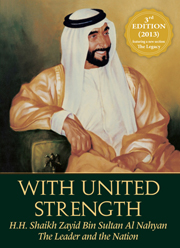Book contents
- Frontmatter
- Contents
- Note on Transliteration
- Abbreviations and Acronyms
- Foreword
- Introduction
- Part I The Heritage
- Part II The Transformation
- Part III The Union
- Chapter 7 Birth of a Nation
- Chapter 8 Sustaining the State
- Chapter 9 Defense and Preservation
- Chapter 10 With United Strength
- Part IV The Legacy
- Conclusion
- Notes
- Select Bibliography
- Index
- Plate Section
Chapter 10 - With United Strength
from Part III - The Union
Published online by Cambridge University Press: 05 September 2014
- Frontmatter
- Contents
- Note on Transliteration
- Abbreviations and Acronyms
- Foreword
- Introduction
- Part I The Heritage
- Part II The Transformation
- Part III The Union
- Chapter 7 Birth of a Nation
- Chapter 8 Sustaining the State
- Chapter 9 Defense and Preservation
- Chapter 10 With United Strength
- Part IV The Legacy
- Conclusion
- Notes
- Select Bibliography
- Index
- Plate Section
Summary
In 1953, the philosopher and historian Sir Isaiah Berlin published a study of political leadership entitled The Hedgehog and the Fox. The book dealt with the role of ‘great men’ and their impact on the course of history. Berlin referred to what he considered the essential distinction between two types of human beings. First, there are those who ‘know one big thing.’ They construct their perceptions of the world, their thoughts and feelings on the basis of this ‘one big idea.’ As a result, their views are all-embracing and seamlessly integrated. The second type seeks to accomplish a multiplicity of objectives, some of which may be contradictory. Berlin assigned the Greek political thinker Plato and the eighteenth-century German philosopher Georg Hegel to the first category, while suggesting that the Greek philosopher Aristotle and the historian Herodotus belonged to the second. However, Berlin also recognized that some great men possessed the best of both.
Based on the analysis presented in this book, it is evident that Shaikh Zayid Bin Sultan Al Nahyan is a rare example of an exceptional individual who has succeeded in blending fundamental principles with pragmatism. He plainly ‘knew one great thing,’ which was that disunity had been the curse of the Arab peoples and the cause of their decline from their early triumphs. An empire that had once ruled supreme from Cordoba in the west to Kabul in the east had been irreversibly weakened by endless division and dissension. Shaikh Zayid could see the perils of disunity among his own people in the Arabian Gulf.
- Type
- Chapter
- Information
- With United StrengthHH Sheikh Zayed Bin Sultan Al Nahyan: The Leader and the Nation, pp. 243 - 262Publisher: Emirates Center for Strategic Studies and ResearchPrint publication year: 2013



